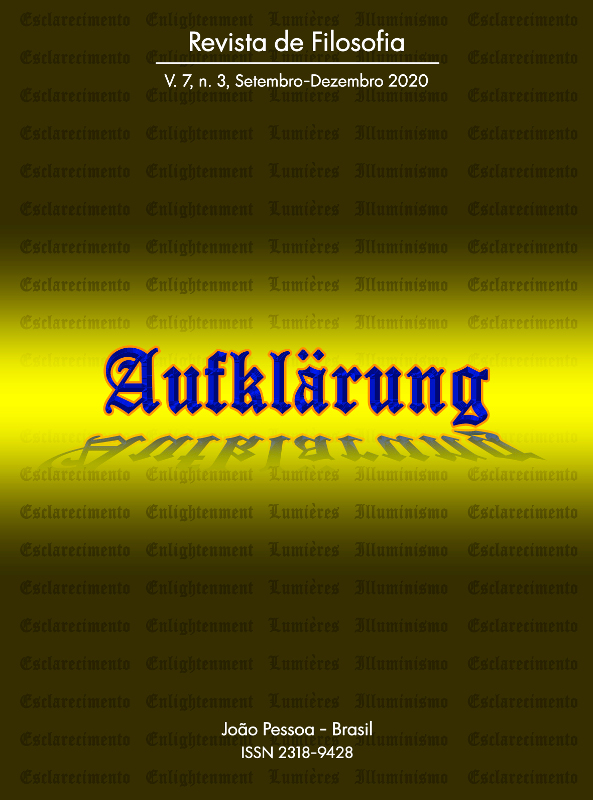The resignification of culture from the scientific revolution: a study based on Michel Henry’s phenomenology
DOI:
https://doi.org/10.18012/arf.v7i3.52802Keywords:
Michel Henry, Life, Culture, Science, BarbarismAbstract
This article aims to describe culture as a manifestation of original life, barbarism as a result of the arrival of the modern scientific revolution and the resignification of life and culture based on this objectivity of be. We start from Michel Henry's theory that life manifests itself in an original and absolute, in its sensitivity, constituting culture and art as concrete manifestations of life in its different elementary forms. However, with the arrival of science, subjectivity became objectified leading to forgetfulness of life and cultural decay, which originated barbarism. In A Barbárie, Henry describes this radical change that occurred with the scientific revolution in which culture and life were reframed. Thus, we intend to describe these new conceptions from a phenomenological proposal and the possibility of a return to life and the original sensitivity that were forgotten by its objectification.
Downloads
References
FURTADO, Luiz José. A filosofia de Michel Henry: uma crítica fenomenológica da fenomenologia. Dissertatio, p. 231-249, inverno/verão de 2008. Disponível em: http://www.ufpel.edu.br/isp/dissertatio/revistas/27- 28/27-28-10.pdf.
HENRY, Michel. De la subjectivité. Tome II Phénoménologie de la vie. Paris: Épiméthée, PUF, 2003.
HENRY, Michel. L’essence de la manifestation. Paris: Épiméthée, PUF, 2011.
HENRY, Michel. O que é isso a que chamamos de vida?. In: MARQUES, R. V., MANZI FILHO, R. (Orgs). Paisagens da Fenomenologia Francesa. Trad. Rodrigo V. Marques. Conferência pronunciada na Universidade de Québec em Trois-Rivières, em primeiro de novembro de 1977. Curitiba: Editora UFPR, 2011.
HENRY, Michel. A Barbárie. Trad. Luiz Paulo Rouanet. São Paulo: É Realizações Editora, 2012.
HENRY, Michel. Difícil Democracia. Revista Ápeiron Estudios de Filosofia, Madrid, n. 1, p. 413-432, 2014.
HENRY, Michel. O amor de olhos fechados. Trad. Pedro Sette-Câmara. São Paulo: É Realizações Editora, 2015.
KÜHN, Rolf. Ipseidade e Praxis Subjectiva: Abordagens fenomenológicas e antropológicas segundo o pensamento de Michel Henry. Trad. José Rosa, Helena de Jesus e Adelino Cardoso. Lisboa: Edições Colibri, 1944.
MARTINS, Florinda; SALDANHA, Marcelo. Michel Henry: critérios para avaliação de uma obra de arte. Revista da Fundarte, n.27, jan./jun. 2014, p. 55-64.
MEIRA, Valéria Peixoto. A barbárie na cultura da modernidade, sua banalização na sociedade e consequente perda dos significantes. Anais do Congresso Internacional da Faculdades EST, São Leopoldo, v.2, 2014, p. 318-326.
PALOMAR TORRALBO, Agustín. El valor cultural del arte en la época de la barbarie: la fenomenología estética de Michel Henry. Estudios de Filosofia, n.58, julh./dez. 2018, p. 143-167.
PRASERES, Janilce S. Fenomenologia da afetividade: um estudo a partir de Michel Henry. Dissertação (Mestrado em Filosofia) – Centro de Ciência Sociais e Humanas, Universidade Federal de Santa Maria. 2015.
Additional Files
Published
How to Cite
Issue
Section
License
Journal general policy
1.This journal works under a Creative Commons License aplied to online journals. That icence can be read in the following link: Creative Commons Attribution 4.0 International (CC BY 4.0).
2.Accordingly to this License, a)the journal declares that authors hold the copyright of their articles without restrictions, and they can archieve them as post-print elsewhere. b)the journal allow the author(s) to retain publishing rights without restrictions.
Metadata Policy for information describing items in the repository
1. Anyone may access the metadata free of charge at anytime.
2.The metadata may be re-used in any medium without prior permission, even commercial purposes provided the OAI Identifier or a link to the original metadata record are given, under the terms of a CC BY license refered for the Journal.







































